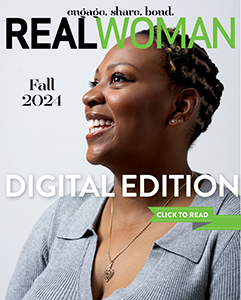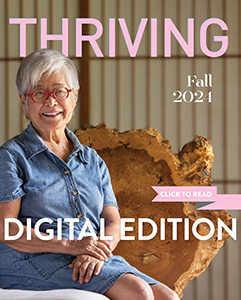When you first walk into a Suppers meeting, the commotion can make your head spin. The kitchen is buzzing with activity, as about 10 people work together to prepare a nutritious meal. Someone’s peeling sweet potatoes while someone else is working on shredding cabbage for the slaw, and still another person is stirring the carrot-ginger soup. And despite the spectrum of backgrounds, professions, and health concerns, the reasons the participants are there all boil down to one common thing—they want to improve their physical, mental, and emotional health by making better food choices.
Suppers is a nonprofit initially developed by Dorothy Mullen, a Princeton resident. The first iteration, started in 2006, was called Suppers for Sobriety, and focused on recovering alcoholics. But Suppers has evolved and grown, its tentacles spreading across Central Jersey and now into other states, as hundreds of people pile into Mullen’s home or that of other hosts for one of 40 meetings that take place on a monthly basis.
In collaboration with medical doctors, Mullen set out to create a program that was as close to free as possible, and which helps people understand how to improve their relationship with food and manage their blood sugar through eating well. By encouraging people to abandon processed foods and adapt their palates to include a variety of nutritious whole foods, Mullen’s goal was to show people they could make a significant difference in their own health by carefully controlling their diets.
“In my brain, the program was initially about recovering, and it was based on blood sugar. That was the original vision. If you could teach people how to eat in such a way that it would stabilize their blood sugar and mood chemistry, you would probably find a way of eating that was good for so much of what ails them,” Mullen says. “What’s good for the blood sugar is good for the heart, what’s good for the blood sugar is good for the brain.”
In Mullen’s own words, the program she created 10 years ago is a “corrective social experience cleverly disguised as cooking and dining events,” but that doesn’t scratch the surface. In each Suppers meeting, people gather together to prepare and share a gluten-free, dairy-free, sugar-free meal that is designed to help participants stabilize their blood sugar, lose weight, alleviate joint inflammation, improve their mood, and boost their immunity during cancer treatments, as well as a host of other positive by-products.
In many cases, it’s about helping participants understand that they can actually change their food palate in the direction of liking healthy foods. And participants are embracing the concept. “I can’t get new meetings launched fast enough. There’s so much need and demand in this community, particularly if you can do it like we do it as a nearly free-to-users program,” Mullen says. “We attract people who know they can’t sustain the behavior changes they need to make unless they have friends, learn how to cook, taste food, and realize they really do like kale. We attract people who love to have a community in order to make their changes.”
Through a “no judgment” approach, Suppers takes the stance that many foods—especially processed foods—are addictive, and that in many cases the people who are most negatively impacted by unhealthy foods have the most difficult time staying away from them. In the forward of Mullen’s book, Logical Miracles, it says: “The seemingly unstoppable progression into an epidemic of Type 2 Diabetes—and all the mood and health issues that go with it—is driven by the profitability of getting people hooked. The Suppers Programs fill a niche that has been empty for a long time. There has been no cost-free support group that fosters care of the physical body the way the 12-step programs foster relationships with a higher power.”
Suppers encourages participants to not only keep track of what they eat, but also record the body’s response to it. To help them in that endeavor, Suppers’s website offers a beginner’s questionnaire, along with an index of recipes, nutritional resources, and a regularly updated blog with information and first-person accounts.
 Here’s how and why Suppers is working for some of its participants, in their own words.
Here’s how and why Suppers is working for some of its participants, in their own words.
Bebe: I was battling a host of things: an autoimmune disease, rheumatoid arthritis, and depression, and I was grossly overweight. When I came to Suppers, it was the first time I found a program that wasn’t a temporary solution. Lose 40 pounds in 20 days! That’s not what I was looking for. I was looking for good health. Suppers is a comforting, safe, nurturing environment that is completely non-judgmental. It’s a community-based nonprofit that helps people find their own pathway to more vibrant health through understanding what foods to eliminate and add and what spices and nutrients will enhance their foods and their lives.
Anne: What I found made a profound difference in my life. By preparing recipes with others who have diabetes, I’ve learned about foods that are good for me as a diabetic and that help to stabilize my blood sugar levels. Recently, I had a serious scare from a kidney stone that caused renal failure, and additional kidney damage. This meant I could no longer take Metformin. My doctor gave me a choice: start using insulin, or make changes to my diet. I chose the dietary route, and after using the things I learned from Suppers, I have maintained a 5.8 A1c level, which means I do not need to take insulin. Without Suppers I would most likely be taking insulin to control my diabetes.
Lori: One of the most powerful things Dorothy Mullen has done is give people a forum to tell their stories. You’re either going to stay with your story and get ill, or you’re going to change your story and get well. For me, I learned to retrain my taste buds. When I cut out the sugar and eliminated soda, I went through withdrawal for about a month. But eventually, I started to feel great. Then I’d taste something with sugar, and it would taste too sweet. My cholesterol dropped from 270 to 220.
Alex: Suppers helps me understand my brain’s need and desire for sweet, salt, and fat, and how it affects my behaviors and how it influences my thinking with cravings and addictive eating. Suppers helped me because I need to learn, re-learn, and remember that if I eat well, I will feel better, and the better I feel, the more productive, giving, and happy I can and will be. Suppers makes perfect sense and delivers a logical miracle to me.
Danny: I came to Suppers because my wife was diabetic, and I needed to be able to cook for her. When she died, I really fell off the wagon and ate every junky thing on the planet. Now I make it to every Suppers known to man in an effort to get good meals in me.







I became part of The Supper’s Program in 2010. I have great appreciation for Dorothy and all her program has taught me about healthy eating and cooking. I continue to stay active with Suppers and I feel so much healthier since doing so. My dream is to motivate my entire community to make their health a priority by taking advantage of all Supper’s has to offer.
As a member, and as a facilitator of Suppers, I am excited to see the word spreading about this effective program that has profoundly improved my life – in body, mind and spirit! Thank you for a wonderful article.
This is a FABULOUS program! I can personally attest to the profound impact that this program has on creating health and wellness. It should be as widely known of as AA. Suppers saves lives.
I’m gratified to see this validation of our work in the pages of Real Woman. Readers should know that Suppers is a delightful social outlet for people who want to socialize with others who share their intentions about cooking and eating read food. I want to hear from you! Dor@TheSuppersPrograms.org
As a facilitator of Suppers meetings for people with diabetes, I can attest that Suppers fills a niche that does not currently exist anywhere else… That of actually supporting people to make healthy foods by cooking them together. It is way beyond merely giving someone a recipe. When you have participated in actually preparing a recipe, you will be more inclined to go home and try it in your own.
If you are struggling with your diabetes… I encourage you to find a Suppers meeting to attend.
The Suppers Programs is an amazing organization. When I became part of the program I had already began making changes to my diet but, what I was missing was social support. Cooking, learning and sharing in a group setting made an enormous difference in my health. Attending meetings regularly taught me more than I could have ever imagined. I am so thankful for Suppers and believe that it was the missing link to my journey to a healthy lifestyle.
Attending Suppers has taught me so much! Dorothy has an incredible amount of knowledge which she graciously shares with anyone who is interested in health, cooking and nutrition.
Although Dor doesn’t claim to be an expert she has helped so many people discover diet and lifestyle changes that have led to better health. I can’t think of any other place where it’s so easy to find like minded people come together and support one another.
I support and refer patients to Suppers to receive social support while discovering what nourishes their bodies.
The tenants of Suppers; the social support, the individual response to different foods and the restoration of family meals are being validated by evidence-based emerging scientific literature. Suppers is a pioneer in what works and delivers a valid and unique method to restore health.
I support and refer patients to Suppers because Suppers offers social support while allowing the individual to discover what nourishes his/her specific needs.
The tenants of Suppers: social support, individual responses to different foods (“how you feel is data”), and the restoration of the family table are supported by evidenced-base emerging scientific literature.
Suppers offers a valid and unique solution to restoring health. The scientific data is just catching up.
For a long time, I could not predict how I would feel day-to-day. With Suppers support, I did some experiments .and found that eliminating certain foods made an enormous difference in my
daily feeling of wellness. Without Suppers, it would never have occurred to me to do this!
I got my doctor’s attention regarding Suppers Program when we saw a major drop in my blood sugar levels, and I told him: “it’s all because of Suppers”!
Sometimes, I feel as if I have learned as much about healing from the people at Suppers as I did in medical school. Just this week, I used Suppers principles to help a person with severe asthma, unresponsive to medications, turn the corner through a change in diet that reduced inflammation. It is amazing how many chronic problems that cannot be fixed with medications are curable by a personalized approach to diet. Suppers is the ideal place for experimenting with this personal approach. I hope that the program spreads across the entire USA.
As a Suppers members for over three years now and also a facilitator, I can attest to the fact that Suppers is a unique program that fills a huge void in the way people need to be addressing both their medical issues as well as psychiatric issues. The way we eat has great impact on how we feel and learning how to eat whole and clean food according to our individual biological needs can go a long way in helping to cure what ails us. The Suppers program is essentially a free to users program that teaches people to honor their biological individuality, teaches them how to cook and eat whole clean food and provides a non judgmental and supportive environment for them to make life sustaining changes. It often boggles my mind that the concept is so simple in nature, the cost is practically nil (if you attend a meeting you only pay for the shared cost of buying the groceries for the meal) and the results can be incredibly profound. I have personally witnessed many people in the Suppers program either minimizing and sometimes even reversing illnesses that have plagued them for years. It is truly amazing to see what good whole clean food and non judgmental support can do.
The Suppers model gives us the tools to make changes in our lives in a supportive environment. At Sharp Again, we are helping people improve their memories and in some cases, reverse dementia and Alzheimer’s. Food is a big part of this, and we’ll be partnering with Suppers for Brain Health to bring patients and their families to the table. Thanks, Dor, for bring Suppers to the next level!